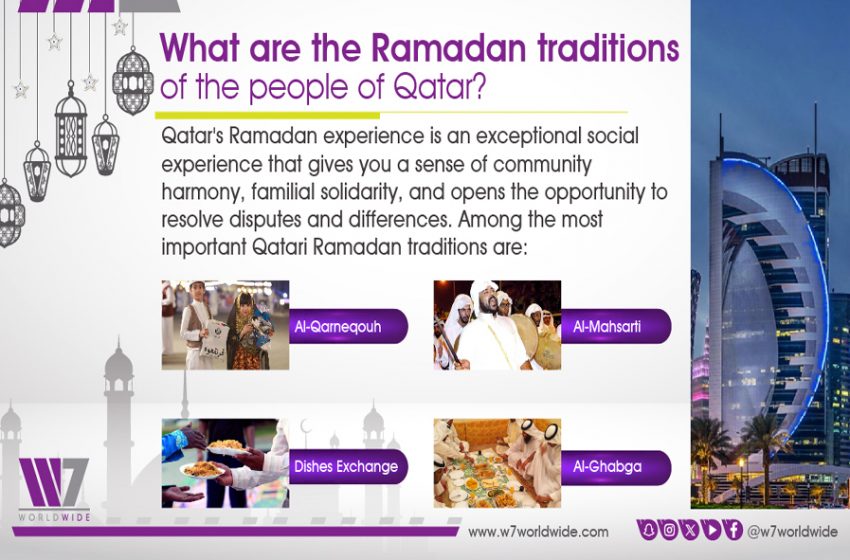4 intriguing customs practiced in Qatar

Ramadan in Qatar is not much different from most Gulf countries as people strive to maintain the customs of their ancestors. Customs that relate to gathering, generosity, and hospitality are treasured. However, there are some traditions that fade away and are replaced by new forms of expressing joy at the advent of the month or spending time in worship.
At W7Worldwide, we have compiled the top 4 Ramadan traditions in Qatar, which are:
Al-Musaharati: Qataris start preparing for Ramadan a month in advance, like most Muslims, a tradition that dates back to the ancient past when people would prepare mosques, clean them, and the process of buying essential items such as flour, grains, and rice intensifies.
The Musaharati role is allocated to a family in each neighborhood, called ” Al-Musaharati Family,” a profession passed down from generation to generation to awaken people before the dawn prayers. Al-Musaharati wanders the neighborhood at the time of the suhoor, waking people up, and carrying a basket called “Al Zabili,” filled with nuts and sweets, distributed on the night of “Qarneekoa” and on the night of Eid.
Ghabga: A Qatari Arab tradition that varies in name and method in different Arab countries but all agree on its concept. It is a large-sized evening meal after Iftar, richer in dishes, eaten between the Iftar and Suhoor meals, with families gathering together to enjoy the Ghabga meal. It includes popular Qatari dishes we previously discussed.
Qaranqooa: A popular traditional practice among Gulf residents, known as “Qarqee’an” in Saudi Arabia. It is a celebration that started for children in the middle of Ramadan to encourage them to fast but has expanded to include everyone. Families gather at night for the Ghabga meal, with bags filled with nuts and sweets distribute them to the children of the neighborhood who sing the traditional “Qaranqooa” song during the night. The word means knocking something (the sound of nuts in bags, or knocking on doors).
Dish Exchange: Ramadan is a month of social gatherings, where people gather after Taraweeh prayers in councils to exchange small talk, in addition to family visits. One of the most important forms of this social interaction is dish exchange between neighbors. This tradition dates back to the past and is meant to increase the bond of affection and love between neighbors. Thus, the table contains several dishes even if some of them are repeated, and people still adhere to this generous tradition, albeit in different forms and sizes, with some people recently tending to send multiple dishes rather than just one. This tradition is associated with the virtues of Islam that encourage increased social interaction and bridging communication with people in the form of mutual giving.
The experience of Ramadan in Qatar is an exceptional social experience that gives you a sense of community harmony, familial solidarity, and opens the opportunity to resolve disputes and differences. We advise you to spend Ramadan in Qatar at least once in your life!






